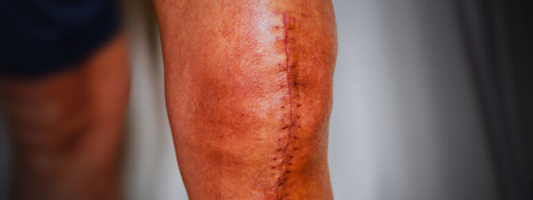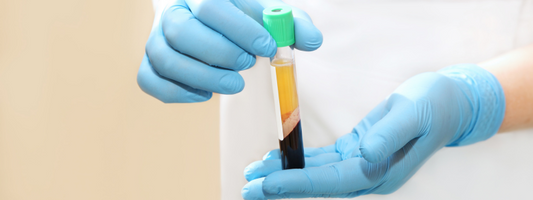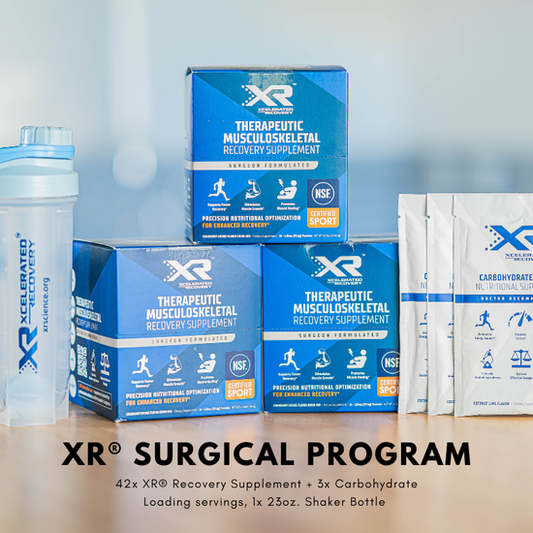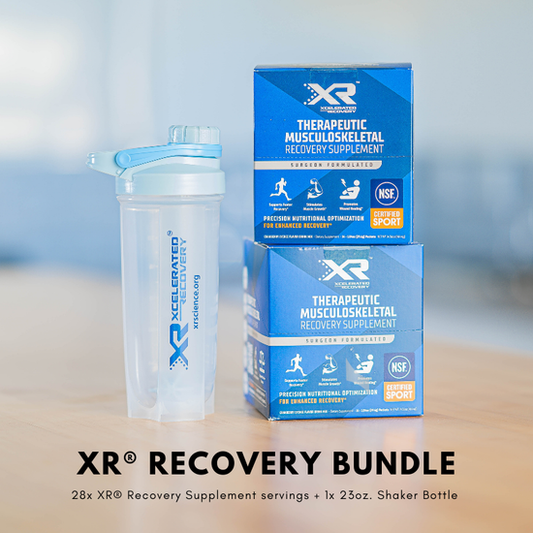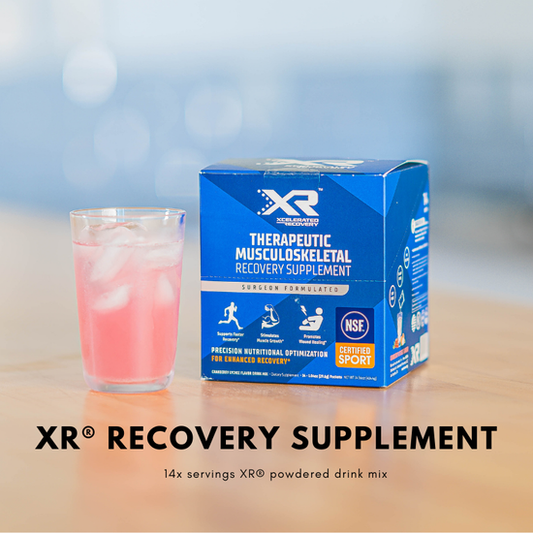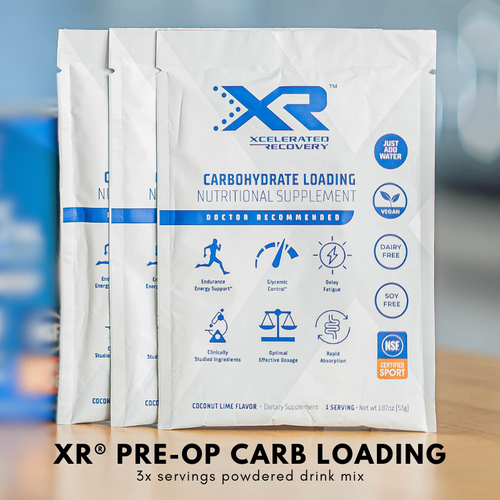
How Can I Recover Faster From Surgery?
Share
What can you do as a patient to improve the success of your surgery?
Most people experience a sense of uncertainty before surgery. Having surgery is a big deal, and it’s normal to feel some anxiety. One of the best things you can do is combat stress and fear of the unknown with understanding and taking control of the situation with a plan.
PREPARE FOR SURGERY LIKE AN ATHLETE.
Similar to an athlete training for a competitive event, preparing for surgery requires physical, mental and nutritional optimization. This approach empowers you as the patient to be an active participant in optimizing your surgical outcome.
The XR™ Perioperative Optimization Program focuses on these 3 pillars as the foundation for what every patient can control to set themselves up for the best possible recovery.

Training for Surgery: The Trifecta
- Prehab
- Rehab
- Start pre-op (ideally 2 weeks prior to surgery)
- At least 6 wks post-op
- Start 1 wk pre-op
- 2-6 wks post-op
- Refer to your surgeon’s recommendation regarding the total duration for post-op supplementation.
Getting Fit for Surgery
Prehabilitation:
- Recovery from surgery starts PRIOR to surgery.
- Prehabilitation is the process of enhancing an individual’s functional capacity to prepare for the forthcoming stressor of surgery.
- Surgery specific customized exercises through MHT (myHealthTrack app) are created to safely maximize your mobility and improve your strength and conditioning prior to surgery.
Multiple clinical studies have demonstrated that prehab leads to:
- Increased Pre-surgery muscle strength
- Improved postoperative functional performance
- Faster return to sports
- Improved patient reported outcomes
- Decreased Pain
Mental Fitness:
- Stress and anxiety reduction techniques are a vital aspect of surgical success. MHT (myHealthTrack app) provides tools to mentally prepare for “game-day”.
Rehabilitation:
- The physical and mental edge that you will gain at the preop stages will serve to carry you through the post-op REHABILITATION period. (1)
- Whether you choose to continue utilizing MHT as a resource for your post-op rehab, or as an adjunct to your surgeon’s physical therapy program, this program will give a head start to your recovery.
Muscle-Centric Diet
Nutrition plays an essential role in injury recovery and surgical rehabilitation. The XR™ Perioperative Optimization Program includes access to a muscle-centric diet calculator specifically designed to optimize MPS (muscle protein synthesis). This nutritional approach focuses on obtaining adequate daily amino acid intake to address muscle loss/sarcopenia and recovery from injury or surgery.
The perioperative dietary program ideally starts 2 weeks prior to surgery and continues for at least 6 weeks after surgery. Research supports practical nutrition recommendations to reduce surgical complications, minimize deficits after immobilization and maximize the chance of safe return to functional mobility. (3)
The XR™ muscle-centric diet recommendations include identifying your caloric requirements to ensure that energy needs are being met. A higher protein intake, with special attention to evenly distributed consumption throughout the day, will help to minimize loss of muscle and strength during immobilization. Special attention to macronutrient quantity, and timing around rehab/exercise is provided.
The Muscle-Centric Recovery Diet Plan:
(3 weeks - 21 days) minimum
(8 week - 54 days) ideal duration
Nutritional Supplementation
Injury and surgery elicit a significant stress response triggering an elevation in catabolic hormones. During this period there is a significant increase in the demand for amino acids which commonly leads to muscle breakdown to provide these essential building blocks for healing and repair.
High-quality whole foods are the ideal source for obtaining nutrients for activities of daily living. However, during the hyper-catabolic periods surrounding surgery, dietary-supplement strategies are vital to help prevent the muscle loss which is seen during the recovery and immobilization period.
Advances in nutritional science have identified key nutrients to be effective in preserving muscle mass, improve wound healing and increase post surgery muscle strength. XR™ Recovery Supplementation has been specifically formulated to support the body's natural recovery process by mitigating the stress and associated muscle atrophy seen with musculoskeletal injuries and surgeries.
Clinical studies have demonstrated improved operative outcomes, decreased muscle loss, faster return to functional activity and decreased complications when orthopaedic patients were provided targeted nutritional supplementation at least 2 weeks after surgery. (2)
The XR™ Perioperative Optimization Program is designed as a practical and effective approach to improving the surgical recovery process. All 3 pillars: (P)rehab + Muscle-Centric Diet + Nutritional Supplementation are based on clinical studies that have demonstrated improved outcomes when implemented in the recovery process. Applying this Trifecta approach may significantly help the body's ability to recover faster.
Recovery Resources Available To Patients:
Our recent ‘22 survey of over 150 Orthopeadic Surgeons showed that most providers lack the education, time, and resources to maximize their athletes and patients nutritional intake for individual goals.
This reinforces the importance of taking your own recovery seriously. Value being proactive knowing you CAN make a significant impact on the outcome of your recovery and healing process. These resources are available to support and educate you to make the best choices possible when it comes to your health and well being.
If you think nutritional supplementation and the XR recovery program can help you or your patients, please (CONTACT US) for more information.
Click Here to learn more about the Muscle Centric Diet for Recovery
References:
Aytekin, E., et al. (2019). The effect of a 12 week prehabilitation program on pain and function for patients undergoing total knee arthroplasty: A prospective controlled study. Journal of Clinical Orthopaedics and Trauma.
Briguglio, M., et al. (2022). Nutritional and physical prehabilitation in elective orthopedic surgery: Rationale and proposal for implementation. Therapeutics and Clinical Risk Management.
Cunha, J., et al. (2022). ACL prehabilitation improves postoperative strength and motion and return to sport in athletes. Arthroscopy, Sports Medicine, and Rehabilitation.
Gometz, A., et al. (2018). The effectiveness of prehabilitation (prehab) in both functional and economic outcomes following spinal surgery: A systematic review. Cureus.
Michael, C. M., et al. (2021). Prehabilitation exercise therapy for cancer: A systematic review and meta-analysis. Cancer Medicine.
Rooks, D. S., et al. (2006). Effect of preoperative exercise on measures of functional status in men and women undergoing total hip and knee arthroplasty. Arthritis & Rheumatism.
Su, W., et al. (2022). The effects of preoperative rehabilitation on pain and functional outcome after total knee arthroplasty: A meta-analysis of randomized controlled trials. Journal of Orthopaedic Surgery and Research.
Villers, J. F., et al. (2020). Physical therapy prehabilitation on a reverse total shoulder replacement candidate: A case study. Journal of Physical Therapy Science.
Yin, H., et al. (2022). A systematic review and meta-analysis on randomized control trials for preoperative rehabilitation in patients planning for joint replacement surgery for better outcomes. Journal of Healthcare Engineering.



